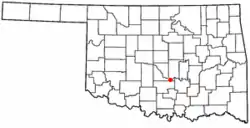Byars, Oklahoma
Byars is a town in McClain County, Oklahoma, United States. The population was 255 at the 2010 census.
Byars, Oklahoma | |
|---|---|
 Location of Byars, Oklahoma | |
| Coordinates: 34°52′22″N 97°3′0″W | |
| Country | United States |
| State | Oklahoma |
| County | McClain |
| Area | |
| • Total | 1.65 sq mi (4.26 km2) |
| • Land | 1.54 sq mi (3.99 km2) |
| • Water | 0.11 sq mi (0.28 km2) |
| Elevation | 1,030 ft (314 m) |
| Population (2010) | |
| • Total | 255 |
| • Estimate (2019)[2] | 273 |
| • Density | 177.39/sq mi (68.50/km2) |
| Time zone | UTC-6 (Central (CST)) |
| • Summer (DST) | UTC-5 (CDT) |
| ZIP code | 74831 |
| Area code(s) | 405 |
| FIPS code | 40-10550[3] |
| GNIS feature ID | 1090771[4] |
History
The present community of Byars is one mile southeast of the Camp Arbuckle site in what is now McClain County. Before Byars was established, there was a community called Johnsonville, named for a local rancher named Montford Johnson. Thomas B. Johnson, Chief Justice of the Chickasaw Nation, lived in Johnsonville, his daughter, Katie, married Nathan H. Byars, another local rancher.[5]
In 1903, the Oklahoma Central Railroad (OCR) was very interested in building a community one mile south of Johnsonville, where the OCR was building an east–west line. Katie Byars and her husband donated land to be used for this purpose, despite opposition from their neighbors in Johnsonville. A post office named Byars was opened on April 9, 1903. Byars incorporated in 1906, and the OCR main line reached the town site in July 1908. At statehood in 1907, Byars had an official population of 537.[5]
Geography
According to the United States Census Bureau, Byars has a total area of 1.6 square miles (4.1 km2), of which 1.5 square miles (3.9 km2) is land and 0.1 square miles (0.26 km2) (6.67%) is water.
Byars is located along State Highway 59.[6]
Demographics
| Historical population | |||
|---|---|---|---|
| Census | Pop. | %± | |
| 1910 | 487 | — | |
| 1920 | 629 | 29.2% | |
| 1930 | 502 | −20.2% | |
| 1940 | 466 | −7.2% | |
| 1950 | 284 | −39.1% | |
| 1960 | 256 | −9.9% | |
| 1970 | 247 | −3.5% | |
| 1980 | 353 | 42.9% | |
| 1990 | 263 | −25.5% | |
| 2000 | 280 | 6.5% | |
| 2010 | 255 | −8.9% | |
| 2019 (est.) | 273 | [2] | 7.1% |
| U.S. Decennial Census[7] | |||
As of the census[3] of 2000, there were 280 people, 105 households, and 74 families residing in the town. The population density was 182.0 people per square mile (70.2/km2). There were 118 housing units at an average density of 76.7 per square mile (29.6/km2). The racial makeup of the town was 86.79% White, 10.36% Native American, 0.36% Asian, 0.36% from other races, and 2.14% from two or more races. Hispanic or Latino of any race were 1.79% of the population.
There were 105 households, out of which 35.2% had children under the age of 18 living with them, 52.4% were married couples living together, 12.4% had a female householder with no husband present, and 29.5% were non-families. 24.8% of all households were made up of individuals, and 15.2% had someone living alone who was 65 years of age or older. The average household size was 2.67 and the average family size was 3.16.
In the town, the population was spread out, with 29.3% under the age of 18, 8.2% from 18 to 24, 30.0% from 25 to 44, 16.8% from 45 to 64, and 15.7% who were 65 years of age or older. The median age was 35 years. For every 100 females, there were 87.9 males. For every 100 females age 18 and over, there were 94.1 males.
The median income for a household in the town was $20,357, and the median income for a family was $25,417. Males had a median income of $27,188 versus $20,179 for females. The per capita income for the town was $18,647. About 21.3% of families and 23.6% of the population were below the poverty line, including 31.7% of those under the age of 18 and 10.4% of those 65 or over.
Notes
References
- "2019 U.S. Gazetteer Files". United States Census Bureau. Retrieved July 28, 2020.
- "Population and Housing Unit Estimates". United States Census Bureau. May 24, 2020. Retrieved May 27, 2020.
- "U.S. Census website". United States Census Bureau. Retrieved 2008-01-31.
- "US Board on Geographic Names". United States Geological Survey. 2007-10-25. Retrieved 2008-01-31.
- Thompson, Joy F. "Byars". Encyclopedia of Oklahoma History and Culture. Accessed July 7, 2019.
- Official State Map (Map) (2008 ed.). Oklahoma Department of Transportation.
- "Census of Population and Housing". Census.gov. Retrieved June 4, 2015.
